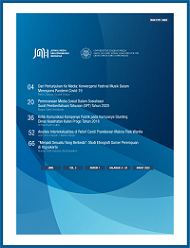Fitness Discourse through Individual Posts on Instagram
Magda Sabrina Theofany Simanjuntak(1*)
(1) Departemen Pascasarjana Ilmu Komunikasi Universitas Indonesia
(*) Corresponding Author
Abstract
Background: The discourse on fitness is one of the prevalent discussions in contemporary society. The fitness discourse, as understood today, is rooted in scientific research and exerts influence over other discourses related to fitness. The most widely embraced notion of fitness by the general public revolves around health. Purpose: Researchers argue that social media has become a means of panopticism, where attributes such as physical activities and sportswear serve as representations of normalized body fitness. This study employs Foucault's arguments in observing the daily posts of social media users regarding body fitness discourses as a form of panopticism. Methods: The research embraces a post-positivist paradigm and employs a mixed methods approach, incorporating both quantitative and qualitative methods. The quantitative segment employs surveys, while the qualitative aspect utilizes in-depth interviews with three informants. Conclusion: The findings of this study illustrate how panopticism manifests in social media posts, encouraging individuals who utilize these platforms to partake in physical activities. Furthermore, the study uncovers how social media posts not only depict the existing reality but also facilitate a simulated reality. Implications: This research underscores how the discourse surrounding body fitness, disseminated through media practices, is perpetuated to bolster dominant groups within the cultural industry.
Keywords
Full Text:
1 - Wacana KebugaranReferences
Aanesen, S. M., Notøy, R. R. G., & Berg, H. (2020). The Re-shaping of Bodies: A Discourse Analysis of Feminine Athleticism. Frontiers in Psychology, 11(July), 1–9. https://doi.org/10.3389/fpsyg.2020.01751
Agustin, S. M. (2019). Panopticism of Normal Body Discourse in Advertisement. Communicare : Journal of Communication Studies, 5(1), 65. https://doi.org/10.37535/101005120185
Allain, K. A., & Marshall, B. (2017). Foucault retires to the gym: Understanding embodied aging in the third age. Canadian Journal on Aging, 36(3), 402–414. https://doi.org/10.1017/S0714980817000216
Baudrillard, J. (1994). Simulacra and Simulation. In University of Michigan Press.
Creswell, J. W. (2013). Qualitative Inqury & Research Design (3rd ed). SAGE Publications, Inc.
Faleatua, R. (2018). Insta brand me: playing with notions of authenticity. Continuum, 32(6), 721–732. https://doi.org/10.1080/10304312.2018.1525921
Fitrianti, R. (2021). Simulacrum Media Di Era Postmodern. Bureaucracy Journal : Indonesia Journal of Law and Social-Political Governance, 1(2), 92–117. https://doi.org/10.53363/bureau.v1i2.29
Foucault, M. (1977). Discipline & Punish The Birth of the Prison. In NY : Random House 195-228.
Galič, M., Timan, T., & Koops, B. J. (2017). Bentham, Deleuze and Beyond: An Overview of Surveillance Theories from the Panopticon to Participation. Philosophy and Technology, 30(1), 9–37. https://doi.org/10.1007/s13347-016-0219-1
George, A., Stumpf, T., & Terry, C. M. (2008). CooperHealth.
Gray, S., Hooper, O., Hardley, S., Sandford, R., Aldous, D., Stirrup, J., Carse, N., & Bryant, A. S. (2022). A health(y) subject? Examining discourses of health in physical education curricula across the UK. British Educational Research Journal, 48(6), 1161–1182. https://doi.org/10.1002/berj.3820
Jong, S. T., & Drummond, M. J. N. (2020). Exploring online fitness culture and young females. Re-Thinking Leisure in a Digital Age. https://doi.org/10.4324/9780429450402-4
Kelly, M. G. E. (n.d.). Foucault ’ s Apophasis : The Mystery Beyond Modernity. A Journal of Intellectual Freedom, 3, 282–297.
LeBlanc, S. S. (2020). “Surveilling the maternal body”: A critical examination through Foucault’s panopticon. Qualitative Report, 25(11), 3885–3901. https://doi.org/10.46743/2160-3715/2020.4307
Markula, P., & Pringle, R. (2006). Foucault, sport and exercise: Power, knowledge and transforming the self. In Foucault, Sport and Exercise: Power, Knowledge and Transforming the Self (Issue March). https://doi.org/10.4324/9780203006504
Michael, D. (2023). Panopticon. 2023.
Mills, S. (2005). Michel Foucault. In U. Robert Eaglestone, Royal Holloway & O. London (Eds.), Taylor & Francis e-Library. Routledge Taylor & Francis Group. https://doi.org/10.35305/sa.vi11.79
O’Farrell, C. (2005). Michael Foucault. In 2005. SAGE Publications Ltd.
Pirkko Markula-Denison, R. P. (2006). Foucault , Sport and Exercise (1st Editio). https://doi.org/https://doi.org/10.4324/9780203006504
Russell-Mayhew, S., Estefan, A., Moules, N. J., Lefebvre, D., Morhun, J. M., Saunders, J. F., Wong, K., & Myre, M. (2022). The optics of weight: expert perspectives from the panopticon and synopticon. Psychology and Health, 0(0), 1–15. https://doi.org/10.1080/08870446.2022.2117810
Snoussi, T. (2020). Social Media and self-identity: Virtual panopticon VS virtual schizophrenia Thouraya Snoussi. Opcion (Scopus), 36(26), 2574–2594.
Souza, B. J., & Ebbeck, V. (2018). Perspectives on Increasing Positive Attitudes Toward Larger Members in Fitness Centers. Journal of Applied Sport Psychology, 30(1), 96–118. https://doi.org/10.1080/10413200.2017.1337822
Walseth, K., & Tidslevold, T. (2020). Young women’s constructions of valued bodies: Healthy, athletic, beautiful and dieting bodies. International Review for the Sociology of Sport, 55(6), 703–725. https://doi.org/10.1177/1012690218822997
Article Metrics
Refbacks
- There are currently no refbacks.
Copyright (c) 2024 Jurnal Media dan Komunikasi Indonesia

This work is licensed under a Creative Commons Attribution-ShareAlike 4.0 International License.
| Jurnal Media dan Komunikasi Indonesia (Online ISSN 2721-396X) is published by the Department of Communication Science (DIKOM), Faculty of Social Science and Political Science (FISIPOL), Gadjah Mada University |













